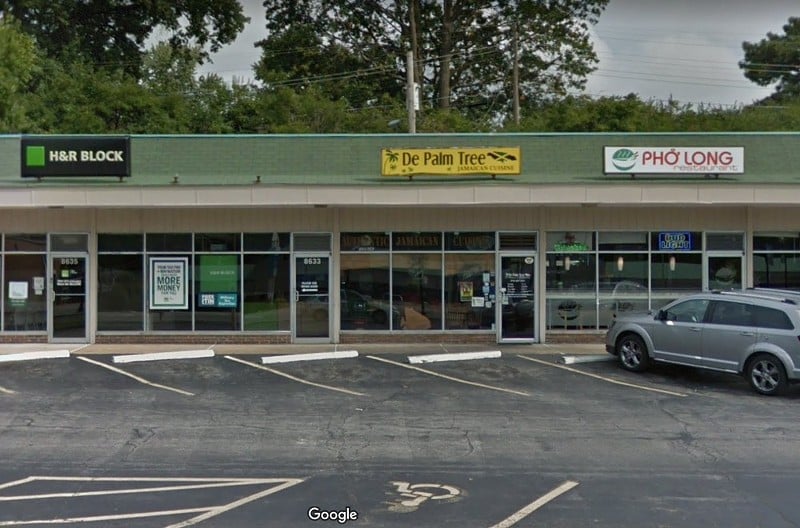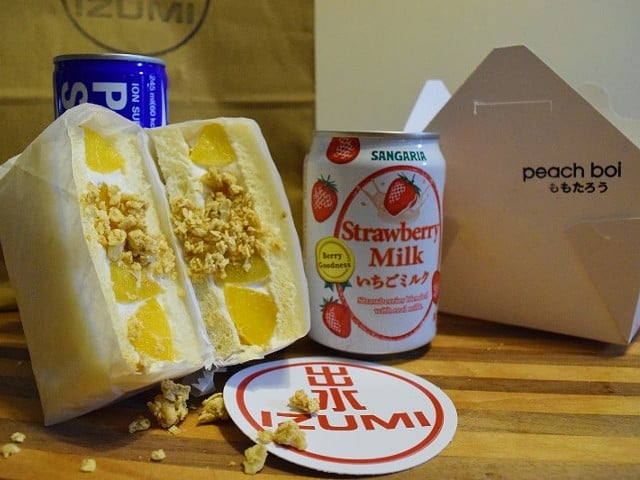
image via Google Maps
De Palm Tree, University City's Jamaican culinary mainstay, is officially closed.
Easton Romer had been hearing the rumors for years: Jeffrey Plaza, the beloved strip mall filled with several immigrant-owned businesses on University City's northwestern edge, was going to be demolished to make room for a Costco. Romer was always skeptical that the deal would actually go through, so he carried on at his Jamaican mainstay, De Palm Tree, figuring the news was nothing more than idle chatter.
Then came the bulldozers.
"I really started believing it about a year ago; it set in when I started seeing big trucks and tractors and construction equipment coming in," Romer says. "Around that time, my lease contract was up, and I kept calling my landlord and telling him that I wanted to sign a one year lease, because I wanted to be comfortable and have that stability that he wasn't going to kick me out. He kept telling me not to worry about it and that he was only doing month to month leases. The next thing I knew, the building was sold, so I started talking to everyone and found out they only had month-to-month leases too. Basically, he made the leases run out on everyone and sold the building."
Like the many other cherished international businesses in and around Jeffrey Plaza — Nobu's, Pho Long, Olive Green International Cuisine, East Seoul Oriental Groceries, to name just a few — De Palm Tree's demise comes courtesy of University City's tax increment financed deal with the developer Novus to bring to fruition a massive $211 million dollar project, "The Markets at Olive," that includes a Costco and other mixed-use retail, hospitality, office and living spaces. In the works since Novus bought Jeffrey Plaza in 2018, the development, seen as a boon to University City's economy by some, was met with fierce opposition from others who see it as undercutting the municipality's reputation as a bastion of diversity and multiculturalism.
That debate was settled by University City's City Council in March of last year, when the body gave its final approval to the project. However, the Council's action did not assuage the concerns of people like Romer, who worry that the deal comes with a substantial cost.
"The thing I really liked about U City — at least back in the day, but it's not like this anymore — is that it was for diversity and small business," Romer says. "I see that changing dramatically now. It was gradual before. It happened in the Loop when they started bringing in big businesses. I used to walk through the Loop on my way to work, and it was all small businesses. A lot of people used to come there to eat at small restaurants, and now it's like not even half of those places are there anymore. I guess they know what they are doing."
For Romer, a Jamaican immigrant who moved to St. Louis in 1989, De Palm Tree was his way of sharing his culture with his newly adopted city. Having worked in restaurants around the area for years, he finally got the money together to open De Palm Tree in 2004 and developed a loyal following over its eighteen years in business. Known for his jerk chicken, salt fish, curries, patties and other Caribbean staples, Romer saw himself as a vital contributor to the multicultural landscape that he believes made his little corner of University City so special. Now, seeing the parking lot of his restaurant surrounded in metal construction fence, the once-bustling businesses vacant and his own restaurant cleaned out, he can't help but feel a sense of loss even beyond his own experience.
"If you think about it, every community is built on small businesses, and you can't take that away and expect people to have the same reaction to whatever they are building," Romer says. "There are so many buildings that go up, and within ten to fifteen years they are empty and growing trees; but they don't care because they just want to make a quick buck. It's unfair to the community, because most of these people are immigrants and they are sharing their culture and artistic works — clothes, food, drawings, music. They really need to slow down, because when they get into trouble, it's the taxpayers who they put the burden on.'
Though Romer is unafraid to raise the red flags that come from such changes, he insists he is not bitter about his situation. "It's important to breathe and not hold onto negativity," he says. Instead of dwelling on the events that led to his having to close De Palm Tree, he is focused on how he can make sure his restaurant lives on in another location. Though University City is on the list of potential neighborhoods he's considering (the municipality offered relocation assistance to businesses that remained in University City, which he has so far declined), he is not locked into remaining there. He also notes that it has been difficult to find a space because of high rent costs, so he is taking his time to make sure that the new location will be the right fit, which will hopefully be a building he can own outright.
In the meantime, Romer is fielding calls on his personal phone number from longtime customers begging him to cook for them. He laughs and tells them that there are other Jamaican places in town, even as his customers insist that there is something special about what he does that makes his food irreplaceable. He believes part of the reason they love it so much is because he cooks everything fresh to order, but ultimately, what makes it so special is that he puts his love for his culture into every single thing that comes out of his kitchen — which he points out is something you will never find at a big box store.
"When you have a passion for something and you are sharing your culture, you aren't going to destroy or alter it; you are going to give it how you want to give it and get people to appreciate it and love it," Romer says. "When you go to a big establishment, most people there are working for a big boss who is never there and are just doing it for the money so they can live. It's way different. That's why small businesses build a community."
We are always hungry for tips and feedback. Email the author at [email protected].



